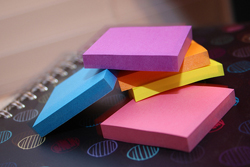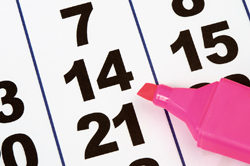
When the exam is looming up it is always a struggle to get started with revision. Here is a strategy that works.
Revision Kit
Make yourself your own personalised revision kit. You need a special pen or pencils. I like a new pack of sharpened HB pencils and a pencil sharpener. Marker pens / highlighters – three colours. Yellow sticky back notelets – you will need very small ones and larger notelets. You can also have a portable audio recorder – or iPod - so that you can record quotes and other material you want to learn on the move. Keep your revision kit next door the place where you will do your revising – it just needs to be a quiet room with a desk or table. Yes you can have music but choose it very carefully so as not to be a distraction.
Using the kit you are going to mark up the files you already have for the subjects you want to revise. For example you need to revise a book for an English exam. You will have a file with quotes, teacher’s handouts and your essays and other written material.

You only need to revise and learn some of this material. That is what the yellow notelets are for.
Look through your file and put a notelet sticking out at the top of the page for each page which has something you need to revise.
Write on the notelet one or two words to remember it by such as Witches Prophecy (from Macbeth).
On the file page highlight the one or two sentences or paragraphs you want to remember. You can’t revise everything so select the most important things you need to know. If the exam is on Macbeth there are key moments in the play that you will want to learn for the exam – the witches prophecy is one of them. There is no need to learn the quote just the gist of what they are saying. You also need to highlight why the witches are important in the play and their role in setting the tone and atmosphere of the drama: dark, evil and Godless.
Marking up and highlighting has two purposes:
- As you are selecting and highlighting you are revising at the same time – what a good idea.
- Making your selection of relevant material will make your revising a lot more focussed.
So what have you done? You have made a decision on what you need to revise, you have located it and you have marked it. Well done, you are on your way, it wasn’t very hard was it? And feel that sense of achievement. This process is a very good way into a topic and can be summed up as: Find - Select - Mark.
Memory Patches

This is an easy way to remember difficult ideas, concepts quotes or equations. Write them on a large yellow sticky back notelet and post them up on a wall, mirror or anywhere in your bedroom AT EYE LEVEL. As soon as you wake up you should see a yellow sticker with something useful on it such as 1789 French Rev.
When you go to the bathroom put up another yellow with 1917 Russian Rev.
You have learned two things this morning – backup these simple facts with more info on each event. So your eye meets a new fact or idea each day.
TIP | Keep the French revolution material in the bedroom and the Russian revolution material in the bathroom, or on different walls in your bedroom. When you test yourself go in your mind to the wall / mirror in each room and relate it to the set of facts that you have put up there: Bedroom = French, Bathroom = Russian.
Choose different areas in your room for different subjects: wardrobe = English, desk wall = geography, mirror = maths. The connection between the area and the subject will help you remember the notes better.
Revision Strategies
Everyone devises their own method of revising. It’s best to stick to the same method for each subject. Here are some methods of working that really do work.
Revise – Test Yourself – Rest
This sounds really hard until you break it down into:
- Revise for a short period – just 25 mins
- Test yourself for just 5 mins by saying: ‘What have I learned just now?’
- Rest for at least 10 mins with a walk, some music, texting, videogame (only 10 mins) or by doing very little – go and talk to a friend, your sister or Mum.
- This way you are working in 40 minute blocks which is what you are used to, because an average lesson time is about 40 mins. Stop after three 40 min sessions and have something to eat or drink. Brainpower uses calories.
Revise Difficult Work First
Nobody said life was easy. You have to revise those difficult equations or that subject you find hard when you are at your freshest. Put it another way, leave the easy stuff to the evening or when you are a bit tired.
Bite Size Is Best
It is much easier to learn small units of information than large ones, so break down topics into bite size chunks – break down all complex info into small chunks.
Organise Your Time

I have left this to the last because for many people it is the most difficult. For people who are naturally well organised they will have organised themselves already. If organisation is an anathema to you (look it up) then follow this advice:
- Don’t be afraid to ask someone to help you organise your time.
- Just do a simple sum – how many days have you got to the exam and how many hours in each day – you just cannot revise all day so decide on how much you feel you can do – say two hours in the morning and two hours in the afternoon, and you can have the evening off. If you want to get an A then you will have to make sure you do at least that amount and more.
Make Lists
It really is a good idea to make at least two lists. One list of all the revision you have to do – then a second listing the topics you need to learn for each subject. Highlight topics that you have completed, so that you can see what you have achieved.
More Help?
- The Practical Guide to Revision Techniques by Simon Percival (Continuum) Best for A Level students
- The Buzan Study Skills Handbook by Tony Buzan (BBC) Useful to read well before the exam season